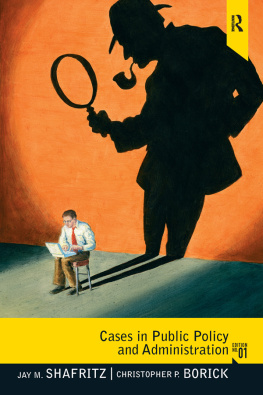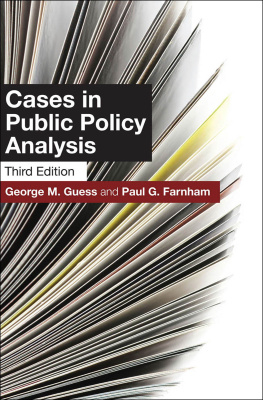First published 2011 by Pearson Education, Inc.
Published 2016 by Routledge
2 Park Square, Milton Park, Abingdon, Oxon OX14 4RN
711 Third Avenue, New York, NY 10017, USA
Routledge is an imprint of the Taylor & Francis Group, an informa business
Copyright 2011 Taylor & Francis. All rights reserved.
All rights reserved. No part of this book may be reprinted or reproduced or utilised in any form or by any electronic, mechanical, or other means, now known or hereafter invented, including photocopying and recording, or in any information storage or retrieval system, without permission in writing from the publishers.
Notice:
Product or corporate names may be trademarks or registered trademarks, and are used only for identification and explanation without intent to infringe.
Credits and acknowledgments borrowed from other sources and reproduced, with permission, in this textbook appear on appropriate page within text.
ISBN: 9780205607426 (pbk)
Library of Congress Cataloging-in-Publication Data
Shafritz, Jay M.
Cases in public policy and administration / by Jay M. Shafritz and Christopher P. Borick.
p. cm.
ISBN-13: 978-0-205-60742-6
ISBN-10: 0-205-60742-X
1. Public administrationUnited States. 2. Public administration. 3. Policy sciences. 4. Political planningUnited States. 5. Political planning. 6. United StatesPolitics and government. I. Borick, Christopher P. II. Title.
JK421.S52 2011
320.60973dc22
2009044810
T his collection of instructive stories on public policy and its administration follows an ancient tradition. Ever since prehistory, stories have been used by tribal elders to illustrate, indoctrinate, and educate. With the advent of writing, the stories, once memorized, were recorded for greater permanency. Thus Homers two great works, The Iliad, on the Trojan War, and The Odyssey, on Ulysses circuitous route home from that war, were first narrative poems, part of the rich oral tradition of ancient Greece. These were not just fun tales to listen to around the fireplace on a long winters night. They offered serious instruction on how to conduct oneself as a warrior, on the nature of honor, on military strategy and tactics, and on how to deal with the gods that abounded in that world. Such stories were not mere entertainments, although they were certainly entertaining; they presented the crucial lessons of life as the ancient Greeks knew it.
THE CASE STUDY APPROACH
So it is not surprising that Greece was the society that produced the Western worlds earliest histories, what we now call case studies, on the ebb and flow of war, on the nature of battles, and on political and institutional leadership. Ever since then, the study of political decision making and its subsequent administrative implementation has been undertaken by means of a case study, usually in the form of an in-depth analysis of a single subject such as a war or battle. Wars tend to make excellent case studies because, at least after they are over, they come with the three key ingredients all cases must have: a beginning, a middle, and an end.
Thucydides History of the Peloponnesian War (404 History provides a full account of the war between the ancient Greek cities of Athens and Sparta. Thucydides made one of the most famous observations on what causes war: What made war inevitable was the growth of Athenian power and the fear which this caused in Sparta. It is possible to discern in this one sentence recognition of what has subsequently been termed the security dilemma, a situation in which one state takes action to enhance its security, only to have this action seen as threatening by other states. The result is that the other states engage in countermeasures, which intensify the first states insecurity. The dilemma arises from the fact that because of this process, actions taken to enhance security can actually end up diminishing it. There is also a dilemma for the second state in that if it regards the action as defensive and takes no countermeasures, it leaves itself vulnerable; whereas if it responds vigorously, it will exacerbate the first states insecurity.
Although he was writing 2,500 years ago, Thucydides distilled the essence of the Cold War conflict between the United States and the former Soviet Union, the current security dilemma facing both Iran and Israel, and countless other international squabbles during the past two millennia. What makes a case useful is not just the information it supplies about itself, but the utility of its wider applicability. So, although Thucydides had no knowledge of the United States/Soviet Union conflict, the lessons of his case concerning ancient Athens and Sparta held universal truths.
This wider applicability of truths, ancient or not, is the essence of a good case. Thus a case is worth reading not just because it is a good story; but because it teaches something beyond itself. Mere entertainment does not suffice for a good case. For example, the story of David, a boy working as a shepherd in ancient Israel, may be interesting, but it is not a case that offers larger truths. However, the story of David versus Goliath is a classic case that has within it lessons of strategy, tactics, honor, fear, and asymmetrical warfareall issues that are still relevant today.
Military colleges and general staffs have long used the case study method to review battles and study generalship. Generalship is not an occupation that gives its practitioners much of an opportunity to ply their trade. Thus most generals fight pitifully few battles. One of the prime reasons that Napoleon Bonaparte was so successful as a general and for so long was that he kept France almost continuously at war. Consequently, he was literally the most experienced general of his age by farhe fought almost sixty major engagements. Even though he lost the last one, Waterloo in 1815, you cannot take all those other victories away from him. Experience counts! And that is why case studies are so useful: They are the only way we know to duplicate cheaply some very expensivein money and/or livesexperiences.
Wait, you say! What about simulations, whether as board games, interpersonal exercises, or computer games? All these are valid training techniques, but they are also just variants of the traditional case study that goes back to Thucydides, who, by the way, was also a general. Unfortunately, he lost the battle for a colony that the Athenians charged him with protecting from the Spartans. As punishment, he was exiled from Athens for twenty years. Fortunately, this gave him the time to write his classic book.
This same military case study technique is now widely used in a civilian context to examine how policy proposals become law, how programs are implemented, and how special interests affect policy development. College courses in business and public administration often use a case study approach. An entire course may consist of case studies (frequently combined into a casebook) of management situations to be reviewed. The goal is to inculcate experience artificially. Any manager rich with years of service will have had the opportunity to live through a lifetime of cases. If life is, as it is often said, one damn thing after another, then a career in business or public administration is, in a parallel sense, one damn case after another. By having students study many cases, each of which may have occurred over many years, the case study course compresses both time and experience.










